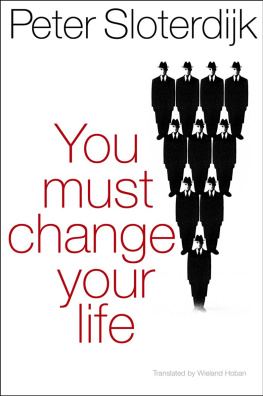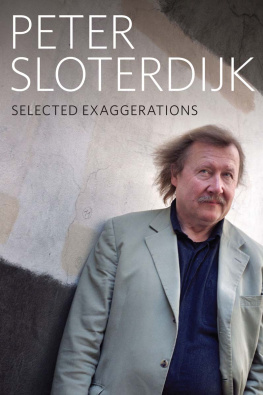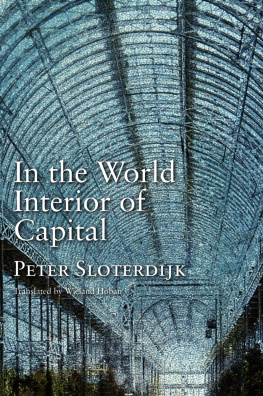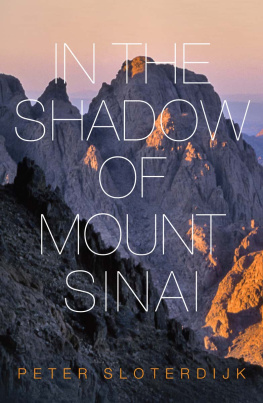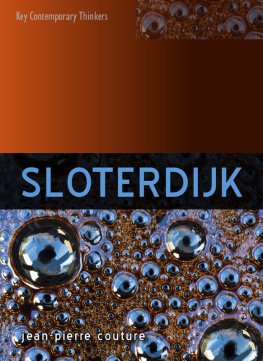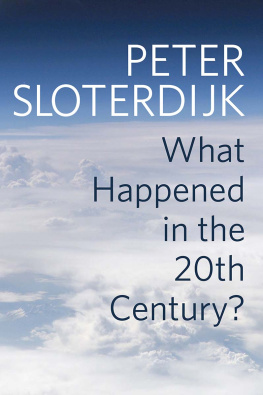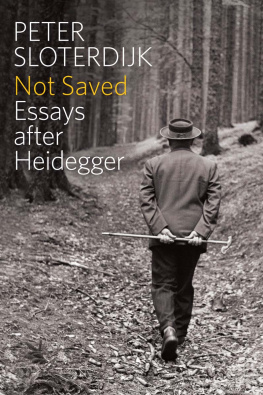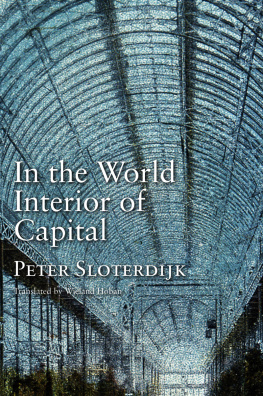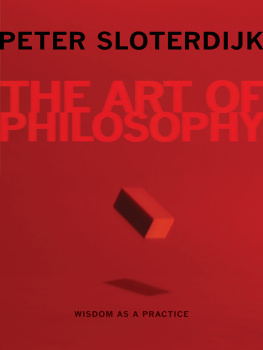Contents
Guide
Print Page Numbers
YOU MUST CHANGE YOUR LIFE
First published in German as Du mut dein Leben ndern Suhrkamp Verlag Frankfurt am Main 2009.
This English edition Polity Press, 2013

The translation of this work was supported by a grant from the Goethe-Institut which is funded by the German Ministry of Foreign Affairs.
Polity Press
65 Bridge Street
Cambridge CB2 1UR, UK
Polity Press
350 Main Street
Malden, MA 02148, USA
All rights reserved. Except for the quotation of short passages for the purpose of criticism and review, no part of this publication may be reproduced, stored in a retrieval system, or transmitted, in any form or by any means, electronic, mechanical, photocopying, recording or otherwise, without the prior permission of the publisher.
ISBN-13: 978-0-7456-9474-0
A catalogue record for this book is available from the British Library.
The publisher has used its best endeavours to ensure that the URLs for external websites referred to in this book are correct and active at the time of going to press. However, the publisher has no responsibility for the websites and can make no guarantee that a site will remain live or that the content is or will remain appropriate.
Every effort has been made to trace all copyright holders, but if any have been inadvertently overlooked the publisher will be pleased to include any necessary credits in any subsequent reprint or edition.
For further information on Polity, visit our website: www.politybooks.com
CONTENTS
Appamdena sampdetha.
Forge ahead in vigilance!
Mahaparinibbana Sutta, 6, 7
Works, rst and foremost!
That is to say, doing, doing, doing!
The faith that goes with it will soon put in an appearance you can be sure of that!
Friedrich Nietzsche, Daybreak
INTRODUCTION
On the Anthropotechnic Turn
A spectre is haunting the Western world the spectre of religion. All over the country we hear that after an extended absence, it has now returned and is among the people of the modern world, and that one would do well to reckon seriously with its renewed presence. Unlike the spectre of communism, which, when its Manifesto appeared in 1848, was not a returnee but a novelty among imminent threats, the present case does full justice to its revenant nature. Whether it comforts or threatens, whether it greets us as a benevolent spirit or is feared as an irrational shadow of mankind, its appearance, indeed the mere announcement thereof, commands respect as far as the eye can see if one passes over the summer offensive of the godless in 2007, to which we owe two of the most superficial screeds in recent intellectual history: those of Chistopher Hitchens and Richard Dawkins. The forces of Old Europe have combined for a pompous welcome celebration with a gathering of unequal guests: the pope and the Islamic scholars, the American presidents and the new rulers of the Kremlin, all the Metternichs and Guizots of our time, the French curators and the German sociologists.
This attempt to restore to religion its attested rights involves the enforcement of a protocol which demands of the newly converted and fascinated that they confess to their previous errors of judgement. As in the days of the first Merovingian, who pledged allegiance to the cross because of a victorious battle, todays children of the banalized Enlightenment are likewise meant to burn what they worshipped and worship what they burned. In this change of direction, long-dormant liturgical intuitions come to the fore. They demand that the novices of post-secular society publicly dissociate themselves from the criticisms of religion in the theorems of the enlightened centuries. During those centuries, human self-determination seemed attainable only at the price of reclaiming the powers wasted on the world above, using them instead to improve earthly conditions as far as possible. Large quantities of energy had to be deducted from God in order to get in shape at last for the world of humans. In this transference of strength lay the lan of the age that had devoted itself to the great singular progress. The humanist aggression even went so far as to elevate hope to a central principle. The supplies of the desperate were to become the primum mobile of better times. Those who chose to advocate this first cause made the earth an immigration country in order to realize themselves there and nowhere else. From now on, the goal was to burn all bridges to the spheres on high and invest the energy thus released in profane existence. If God existed, he would have become the loneliest figure in the universe at that point. The migration from the beyond took on aspects of a mass exodus by comparison, the current demographically thinned-out condition of Eastern Europe seems like overpopulation. That the majority, unimpressed by ideologies of immanence, still indulged in secret excursions across the border in the time of the triumphant Enlightenment is another matter.
In the meantime, quite different drives have gained the upper hand. The situation is governed by complicated perceptions of human chances. Once it gained an awareness of itself, the Enlightenment revealed its own paradoxes and progressed to regions where life, to quote a well-known storyteller, becomes complex and sad. Only tired leftovers of the former unconditional forward impetus have remained in use. Things need only advance a little further and the last of the enlightened hopeful will withdraw to the countryside like the Amish of postmodernism. Other eternal progressives follow the calls of non-governmental organizations that have devoted themselves to saving the world. For the rest, the signs of the times point to revision and regress. More than a few disappointed parties seek to cling to the producers and distributors of their progressive illusions, as if there were some consumer protection for ideas to which they could appeal. The legal archetype of our age, the compensation lawsuit, extends to broad areas of life. Have its American varieties not taught us that one has to demand exorbitant sums at the outset in order to receive a vaguely satisfactory compensation at the end of the lawyers war? The descendants of those expelled from heaven openly seek handsome reparations in fact, they dare to dream of epochal compensations. If they had their way, the entire expropriation of the world above would be reversed. Some newly religious entrepreneurs would like nothing more than to put the disused sites of metaphysical production back into operation overnight, as if we had simply been through a recession.

